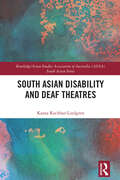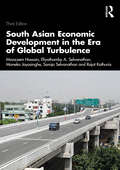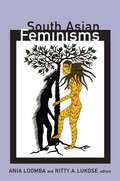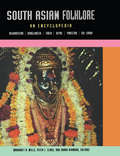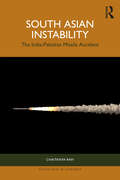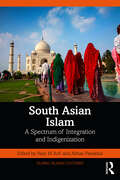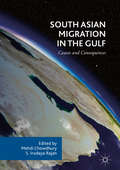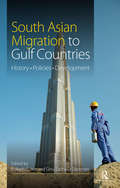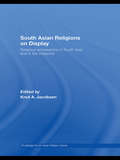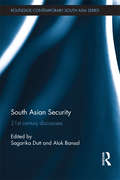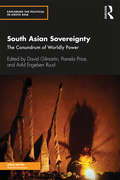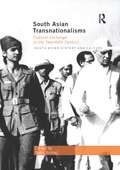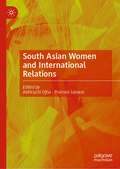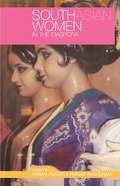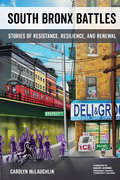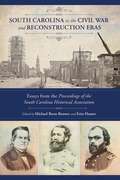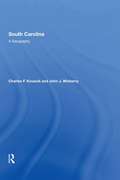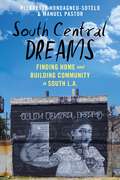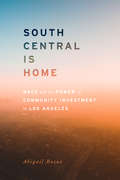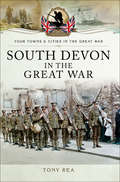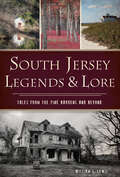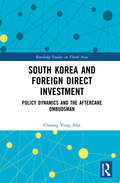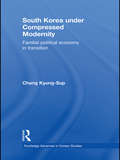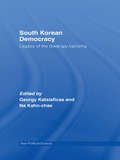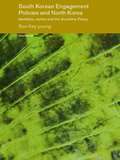- Table View
- List View
South Asian Disability and Deaf Theatres (Routledge/Asian Studies Association of Australia (ASAA) South Asian Series)
by Kanta Kochhar-LindgrenSouth Asian Disability and Deaf Theatres investigates translocal intimacies in relation to twenty-first-century transnational South Asian disability theatres in order to lay out new possibilities for accessible theatres.The book provides a theoretical and methodological framework for thinking through the relationships between disability, translocal intimacies, and visceral ethnography. It presents new and innovative approaches to rethinking bodily, cultural, spatial, and performance practices in relation to disability and disability rights that cut across national, sociocultural, and artistic boundaries. The author presents a consideration of some of India’s specific theatre examples such as Mahesh Dattani’s Tara; Manjula Padmanabhan’s Harvest; Shyambazar Blind Opera House’s Brihannala; Jana Sanskriti’s The Wasteland: A Journey; and First Drop Change Foundation’s Playback Theatre. Through analyses of specific performances and theatre groups and theoretical explorations of visceral ethnography, disability theatres’ decolonising initiatives, and disability as method, this book furthers the project of creating the conditions for a radically accessible and open-door theatre for both the present and the future.The first book to cover theatre and Disability Studies in India, it shows that disability literature and theatres assist in delineating ways of reworking the politics of intimacy and belonging within and across differences. The book makes an important contribution to the broad field of theatre, performance and Disability Studies as well as Feminist Studies and South Asian Studies.
South Asian Economic Development in the Era of Global Turbulence
by Moazzem Hossain Eliyathamby A. Selvanathan Maneka Jaysinghe Saroja Selvanathan Rajat KathuriaSouth Asia’s developing nations have been enjoying moderate to high growth over the past decade before the global pandemic of 2020 began. This new edition provides an up-to-date guide to the growing markets in South Asia in the post-COVID-19 period. It offers an analysis of the changes and consequences of high sustainable growth, investigating what has been achieved in the region over the last 2001-2023 from a macroeconomic viewpoint, identifying new challenges to 2030, and the end of the UNSDGs period.Part I of the textbook presents an analysis of how South Asia is rated against Southeast and East Asia in recent decades in economic and social terms.Part II focuses on South Asia’s economic development over 2000 and the bearly 2020s. It demonstrates that globalization enhanced global trade and that trade further increased the region’s prosperity up to 2020. Part III identifies major governance issues that were responsible for South Asia’s social and economic underperformance due to the COVID-19 pandemic. This new edition includes a new chapter about AI and South Asia in the future. The textbook advocates for a shift in focus from policy reform per se to the more challenging task of implementing institutional reform that will invigorate the capability of the political leadership to bring about rapid, sustained and poverty-reducing growth in South Asia in post-Covid era. The book also considers climate change and the environment, and it analyses the impact of these changes and developments on the economic health and social conditions in South Asia. The concluding chapter demonstrates current political unrest in three South Asian nations, Sri Lanka, Pakistan, and Bangladesh, termed the South Asian Spring. TOffering an analysis of the changes and consequences of high sustainable growth in South Asia, this textbook will be useful for students and researchers in Development Economics, Business Economics, Development Studies, and Asian Studies.
South Asian Feminisms
by Ritty A. Lukose Ania LoombaDuring the past forty years, South Asia has been the location and the focus of dynamic, important feminist scholarship and activism. In this collection of essays, prominent feminist scholars and activists build on that work to confront pressing new challenges for feminist theorizing and practice. Examining recent feminist interventions in India, Pakistan, Sri Lanka, and Bangladesh, they address feminist responses to religious fundamentalism and secularism; globalization, labor, and migration; militarization and state repression; public representations of sexuality; and the politics of sex work. Their essays attest to the diversity and specificity of South Asian locations and feminist concerns, while also demonstrating how feminist engagements in the region can enrich and advance feminist theorizing globally.Contributors. Flavia Agnes, Anjali Arondekar, Firdous Azim, Anannya Bhattacharjee, Laura Brueck, Angana P. Chatterji, Malathi de Alwis, Toorjo Ghose, Amina Jamal, Ratna Kapur, Lamia Karim, Ania Loomba, Ritty A. Lukose, Vasuki Nesiah, Sonali Perera, Atreyee Sen, Mrinalini Sinha, Ashwini Sukthankar
South Asian Folklore: An Encyclopedia
by Margaret A. MillsWith 600 signed, alphabetically organized articles covering the entirety of folklore in South Asia, this new resource includes countries and regions, ethnic groups, religious concepts and practices, artistic genres, holidays and traditions, and many other concepts. A preface introduces the material, while a comprehensive index, cross-references, and black and white illustrations round out the work. The focus on south Asia includes Afghanistan, Bangladesh, India, Pakistan, and Sri Lanka, with short survey articles on Tibet, Bhutan, Sikkim, and various diaspora communities. This unique reference will be invaluable for collections serving students, scholars, and the general public.
South Asian Instability: The India-Pakistan Missile Accident (South Asia in Context)
by Chaitanya RaviThis book examines key concerns in South Asian security through a fine-grained history of the accidental firing of a missile and its aftermath between two nuclear-armed states—India and Pakistan—with tense relations in March 2022. It consolidates the official statements, media discourse and debates within the strategic communities in both countries into a coherent narrative. It looks at the role of key institutions in the crisis such as the Indian Air Force (IAF), The Directorate of Air Staff Inspection-IAF, Indian Ministry of Defence (MOD), Pakistan Air Force (PAF), Pakistani Foreign Office (FO), Inter-Services Public Relations (ISPR) and others. The book also examines the missile accident’s coverage in the international media and discussions in the global think-tank community.Drawing on a host of resources, including published interviews of government officials, analyses in media, and strategic communities in India, Pakistan and the United States, this volume will be key reading for scholars and researchers of military and strategic studies, politics and international relations, public policy and South Asian studies.
South Asian Islam: A Spectrum of Integration and Indigenization (Global Islamic Cultures)
by Nasr M Arif Abbas PanakkalThis volume explores the historical trajectory of the spread of Islam in South Asia and how the engagements of the past have played a crucial role in the making of the present outfits of South Asian Islam. Islam in South Asia has maintained a distinct role while imbibing cultural, social, ethnic, folk, and artistic networks of the subcontinent in diverse echelons. In an unequivocal analysis, this volume showcases the visible varieties of Islam from an array of regional cultural, ethnic, and vernacular groups. While many characteristics remain distinct in different provinces or regions of South Asia, similarities are palpable in etiquettes, customary laws, art, and architecture. More than regional differences, various ethnic groups from all poles of the Indian subcontinent have paved the way for the dissimilar landscapes of Islam, in tandem with differences in language, culture, and festivals. The case studies in this book exhibit forms of cultural pluralism in the communities, which have helped in building a cohesive community. Part of the ‘Global Islamic Cultures’ series that looks at integrated and indigenized Islam, this book will be of interest to students and researchers of religion, religious history, theology, study of Islamic law and politics, cultural studies, and South Asian Studies. It will also be useful to general readers who are interested in world religions and cultures.
South Asian Migration in the Gulf: Causes And Consequences
by S. Irudaya Rajan Mehdi ChowdhuryThis volume explores the reasons behind, and impact of, the migration of South Asian nationals (from India, Bangladesh, Nepal, Sri Lanka, Pakistan, Bhutan and Maldives, Afghanistan and Myanmar) in the Gulf countries (Saudi Arabia, Oman, Kuwait, Qatar, UAE and Bahrain). The authors provide a broad overview of the demographics of the phenomenon, its mechanisms, and focus on the contribution of migrants in various sectors including construction, health and education, and the overall labour market in the Gulf. The book also taps into the regional geo-politics and its links to the South Asian Migration in the Gulf. This book is recommended reading to all those interested in international migration and labour issues.
South Asian Migration to Gulf Countries: History, Policies, Development
by Prakash C. Jain Ginu Zacharia OommenSouth Asians constitute the largest expatriate population in the Gulf Cooperation Council (GCC) countries. Their contribution in the socio-economic, technological and educational development of GCC nations is immense. This book offers one of the first systematic analysis of South Asia–Gulf migration dynamics and its varied impact on countries such as India, Nepal, Bangladesh, Pakistan and Sri Lanka. It deals with public policy, socio-economic mobility, remittance policy, global financial crisis and labour issues. Bringing together essays from contributors from around the world, the volume reveals not only the multi-dimensionality of the migration process between the two regions, but also the diversity and the underlying unity of the South Asian countries. This book will be invaluable to scholars and students of migration studies, development studies and sociology as well as policy-makers, administrators, academics, and non-governmental organisations in the field.
South Asian Religions on Display: Religious Processions in South Asia and in the Diaspora (Routledge South Asian Religion Series)
by Knut A. JacobsenReligious procession is a significant dimension of religion in South Asia. Processions are central not only in Hinduism, but also Islam, Christianity, Jainism and Sikhism, which have large procession rituals. The last years have seen an increase in processions and ritualizations of space both in South Asia and in the South Asian Diaspora. Processions are religious display events and the increase in processions are functions of religious pluralism and competition about public space as well as economic prosperity and a revival of religious identities. Processions often bring together religion and politics since they are about public space, domination and contestation. Written by leading specialists on religious processions and ritualization of public space in South Asia and in the Diaspora, this volume presents current research on the interpretations of the role of processions, the recent increase in processions and changes in the procession traditions. South Asian Religions on Display will appeal to students and scholars of Asian studies, anthropology, religion and political science.
South Asian Security: 21st Century Discourses (Routledge Contemporary South Asia Series)
by Sagarika Dutt Alok BansalThe South Asian security complex refers to security interdependencies between the states in the region, and also includes the effect that powerful external actors, such as China, the US and Russia, and geopolitical interests have on regional dynamics. This book focuses on the national securities of a number of South Asian countries in order to discuss a range of issues related to South Asian security. The book makes a distinction between traditional and non-traditional security. While state-centric approaches such as bilateral relations between India and Pakistan are considered to be traditional realist approaches to security, the promotion of economic, environmental and human security reflect global concerns, liberal theories and cosmopolitan values. The book goes beyond traditional security issues to reflect the changing security agenda in South Asia in the twenty-first century, and is a useful contribution to studies on South Asian Politics and Security Studies.
South Asian Sovereignty: The Conundrum of Worldly Power (Exploring the Political in South Asia)
by David Gilmartin Pamela Price Arild Engelsen RuudThis book brings ethnographies of everyday power and ritual into dialogue with intellectual studies of theology and political theory. It underscores the importance of academic collaboration between scholars of religion, anthropology, and history in uncovering the structures of thinking and action that make politics work. The volume weaves important discussions around sovereignty in modern South Asian history with debates elsewhere on the world map. South Asia’s colonial history – especially India’s twentieth-century emergence as the world’s largest democracy – has made the subcontinent a critical arena for thinking about how transformations and continuities in conceptions of sovereignty provide a vital frame for tracking shifts in political order. The chapters deal with themes such as sovereignty, kingship, democracy, governance, reason, people, nation, colonialism, rule of law, courts, autonomy, and authority, especially within the context of India, Bangladesh, and Pakistan. The book will be of great interest to scholars and researchers in politics, ideology, religion, sociology, history, and political culture, as well as the informed reader interested in South Asian studies.
South Asian Transnationalisms: Cultural Exchange in the Twentieth Century (Routledge South Asian History and Culture Series)
by Babli SinhaSouth Asian Transnationalisms explores encounters in twentieth century South Asia beyond the conventional categories of center and periphery, colonizer and colonized. Considering the cultural and political exchanges between artists and intellectuals of South Asia with counterparts in the United States, continental Europe, the Caribbean, and East Asia, the contributors interrogate the relationships between identity and agency, language and space, race and empire, nation and ethnicity, and diaspora and nationality. This book deploys transnational syntaxes such as cinema, dance, and literature to reflect on social, technological, and political change. Conceiving of the transnational as neither liberatory nor necessarily hegemonic, the authors seek to explore the contradictions, opportunities, disjunctures, and exclusions of the vexed experience of globalization in South Asia. This book was published as a special issue of South Asian History and Culture.
South Asian Women and International Relations
by Pramod Jaiswal Abhiruchi OjhaThis book presents South Asian women’s voices which have been marginalised in the theory and practice of international relations in the region. It highlights critical issues of importance for women which are often neglected in traditional International Relations (IR). Embracing Feminist epistemology, the book re imagines the theory and practice of IR in South Asia, placing women’s experiences and their diverse voices at the centre. Refusing the temptation to typecast women, the book showcases the varied voices of South Asian women in international relations with contributions from an eclectic set of authors from different nationalities. In doing so, the book expands the ontological and epistemological limits of IR by including caste, conflict, protest perspectives. While some of these are uniquely South Asian, like caste, all of them show how the field of IR in general can become enriched by being more inclusive. This book will be of interest to researchers as it provides a fresh conceptual re-conceptualization of the field of IR from gender as well as global south perspective. The book will also help graduate students seeking to understand the intersection of gender and IR.
South Asian Women in the Diaspora
by Nirmal PuwarSouth Asian women have frequently been conceptualized in colonial, academic and postcolonial studies, but their very categorization is deeply problematic. This book, informed by theory and enriched by in-depth fieldwork, overturns these unhelpful categorizations and alongside broader issues of self and nation assesses how South Asian identities are ‘performed'. What are the blind spots and erasures in existing studies of both race and gender? In what ways do South Asian women struggle with Orientalist constructions? How do South Asian women engage with ‘indo-chic?' What dilemmas face the South Asian female scholar? With a combination of the most recent feminist perspectives on gender and the South Asian diaspora, questions of knowledge, power, space, body, aesthetics and politics are made central to this book. Building upon a range of experiences and reflecting on the actual conditions of the production of knowledge, South Asian Women in the Disapora represents a challenging contribution to any consideration of gender, race, culture and power.
South Bronx Battles: Stories of Resistance, Resilience, and Renewal
by Carolyn McLaughlinCommunity activist Carolyn McLaughlin takes us on a journey of the South Bronx through the eyes of its community members. Facing burned-out neighborhoods of the 1970s, the community fought back. McLaughlin illustrates the spirit of the community in creating a vibrant, diverse culture and its decades-long commitment to develop nonprofit housing and social-services, and to advocate for better education, health care, and a healthier environment. For the South Bronx to remain a safe haven for poor families, maintaining affordable housing is the central—but most challenging—task.South Bronx Battles is the comeback story of a community that was once in crisis but now serves as a beacon for other cities to rebuild, while keeping their neighborhoods affordable.
South Carolina in the Civil War and Reconstruction Eras: Essays from the Proceedings of the South Carolina Historical Association
by Michael Brem Bonner and Fritz HamerAn anthology of important scholarship on the Civil War and Reconstruction eras from the journal Proceedings of the South Carolina Historical Association.Since 1931, the South Carolina Historical Association has published an annual, peer-reviewed journal of historical scholarship. In this volume, past SCHA officers of Michael Brem Bonner and Fritz Hamer present twenty-three of the most enduring and significant essays from the archives, offering a treasure trove of scholarship on an impressive variety of subjects including race, politics, military events, and social issues.All articles published in the Proceedings after 2002 are available on the SCHA website, but this volume offers, for the first time, easy access to the journal’s best articles on the Civil War and Reconstruction up through 2001. Preeminent scholars such as Frank Vandiver, Dan T. Carter, and Orville Vernon Burton are among the contributors to this collection, an essential resource for historical synthesis of the Palmetto State’s experience during that era.
South Carolina: A Geography
by Charles F Kovacik John J WinberryAlthough small in land area, South Carolina boasts rich geographical diversity. From the mountains to the sea, from the Savannah River to the Pee Dee River, the state features an array of settings and habitats, all formed over long periods of geologic time and human history. Each stage of the state's history has witnessed the creation of a distinctive environment, and this book explores those changing landscapes and the effect they have on South Carolina today. The authors emphasize the spatial patterns of South Carolina's economic and cultural geography since the first humans occupied the area. The book is divided into three parts–the physical setting, the historical setting, and contemporary South Carolina–and concludes with the identification of ten regional subdivisions based on the state's human geography. In this manner, the book provides a panorama of a distinctive region, an area where Old South meets New South and where the landscape is a product of the state's long history.
South Central Dreams: Finding Home and Building Community in South L.A. (Latina/o Sociology #13)
by Pierrette Hondagneu-Sotelo Manuel PastorWinner of the 2022 Latino/a Section Best Book Award, given by the American Sociological AssociationHonorable Mention for the Robert E. Park Award, given by the Community and Urban Sociology Section of the American Sociological AssociationFinalist for the 2021 C. Wright Mills Award, given by the Society for the Study of Social ProblemsRace, place, and identity in a changing urban America Over the last five decades, South Los Angeles has undergone a remarkable demographic transition. In South Central Dreams, eminent scholars Pierrette Hondagneu-Sotelo and Manuel Pastor follow its transformation from a historically Black neighborhood into a predominantly Latino one, providing a fresh, inside look at the fascinating—and constantly changing—relationships between these two racial and ethnic groups in California. Drawing on almost two hundred interviews and statistical data, Hondagneu-Sotelo and Pastor explore the experiences of first- and second-generation Latino residents, their long-time Black neighbors, and local civic leaders seeking to build coalitions. Acknowledging early tensions between Black and Brown communities. they show how Latino immigrants settled into a new country and a new neighborhood, finding various ways to co-exist, cooperate, and, most recently, demonstrate Black-Brown solidarity at a time when both racial and ethnic communities have come under threat. Hondagneu-Sotelo and Pastor show how Latino and Black residents have practiced, and adapted innovative strategies of belonging in a historically Black context, ultimately crafting a new route to place-based identity and political representation. South Central Dreams illuminates how racial and ethnic demographic shifts—as well as the search for identity and belonging—are dramatically shaping American cities and neighborhoods around the country.
South Central Is Home: Race and the Power of Community Investment in Los Angeles (Stanford Studies in Comparative Race and Ethnicity)
by Abigail RosasSouth Central Los Angeles is often characterized as an African American community beset by poverty and economic neglect. But this depiction obscures the significant Latina/o population that has called South Central home since the 1970s. More significantly, it conceals the efforts African American and Latina/o residents have made together in shaping their community. As residents have faced increasing challenges from diminished government social services, economic disinvestment, immigration enforcement, and police surveillance, they have come together in their struggle for belonging and justice. South Central Is Home investigates the development of relational community formation and highlights how communities of color like South Central experience racism and discrimination—and how in the best of situations, they are energized to improve their conditions together. Tracking the demographic shifts in South Central from 1945 to the present, Abigail Rosas shows how financial institutions, War on Poverty programs like Headstart for school children, and community health centers emerged as crucial sites where neighbors engaged one another over what was best for their community. Through this work, Rosas illuminates the promise of community building, offering findings indispensable to our understandings of race, community, and place in U.S. society.
South Devon in the Great War (Your Towns And Cities In The Great War Ser.)
by Tony ReaSouth Devon in the Great War provides the first definitive history of events in this part of Devon during the First World War, with more than fifty pictures, some unpublished for 100 years. The author's succinct and engaging text is further enhanced by a unique set of then and now photographs, and provides readers with an incomparable pictorial overview of events on the Home FrontTo the casual observer, south Devon may have seemed an agricultural backwater of Britain during the war, important in but two respects; the Britannia Royal Naval College at Dartmouth and the Royal Naval base at Devonport. However, a closer and more considered gaze reveals significant changes. By late 1915 many of the young men and, significantly, almost all of the horses had gone away to war. Older men and many women now farmed the land, aided by German PoWs. Dartmoor Gaol became home to hundreds of Conscientious Objectors put to work on the quarries whilst large and medium sized country houses were converted to hospitals and convalescent homes.Not only does South Devon in the Great War detail these changes, it also explains how the local regiment responded to the call to arms of a whole nation. Within these pages the reader will find many personal tales of sacrifice, loss and grief. Most of all, however, readers will be ultimately uplifted by tales of the endurance of the human spirit.
South Jersey Legends & Lore: Tales from the Pine Barrens and Beyond (American Legends)
by William J. LewisFrom Piney Folklore to Legendary Figures of South Jersey's Past Author William Lewis presents fascinating tales, revealing legends and beloved lore from the heart of Southern New Jersey.
South Korea and Foreign Direct Investment: Policy Dynamics and the Aftercare Ombudsman (Routledge Studies on Think Asia)
by Choong Yong AhnThis book examines Korea’s foreign direct investment policy dynamics and points out the importance of mutual synergy between multinational corporations and their host countries in a win-win framework and the increasing importance of this in a post-pandemic world. A multitude of case studies shows many of the business difficulties foreign investors in Korea face, and how the Foreign Investment Ombudsman has intervened to resolve each one. The book addresses Korea’s challenges and efforts to become a truly preferred FDI destination through active FDI inducement and effective aftercare services. Investigating the ambivalent attitude toward foreign direct investors and foreign migrants in an increasingly globalizing world, the author also analyses the issue of xenophobia. The book demonstrates empirically that appropriate and timely aftercare services can serve as not only a robust facilitator for cross-border investment but also a preventer of undesirable friction between foreign investors and host economies, before disputes become serious legal matters. Finally, it draws policy implications towards a liberal investment order post COVID-19. The book will be of interest to policymakers, investors, and researchers on Korean and East Asian economic studies, FDI promotion, and deregulation for better business environment.
South Korea under Compressed Modernity: Familial Political Economy in Transition (Routledge Advances in Korean Studies)
by Kyung-Sup ChangThe condensed social change and complex social order governing South Koreans’ life cannot be satisfactorily delineated by relying on West-derived social theories or culturalist arguments. Nor can various globally eye-catching traits of this society in industrial work, education, popular culture, and a host of other areas be analyzed without developing innovative conceptual tools and theoretical frameworks designed to tackle the South Korean uniqueness directly. This book provides a fascinating account of South Korean society and its contemporary transformation. Focusing on the family as the most crucial micro foundation of South Korea’s economic, social, and political life, Chang demonstrates a shrewd insight into the ways in which family relations and family based interests shape the structural and institutional changes ongoing in South Korea today. While the excessive educational pursuit, family-exploitative welfare, gender-biased industrialization, virtual demise of peasantry, and familial industrial governance in this society have been frequently discussed by local and international scholarship, the author innovatively explicates these remarkable trends from an integrative theoretical perspective of compressed modernity. The family-centered social order and everyday life in South Korea are analyzed as components and consequences of compressed modernity. South Korea under Compressed Modernity is an essential read for anyone studying Contemporary Korea or the development of East Asian societies more generally.
South Korean Democracy: Legacy of the Gwangju Uprising
by Georgy Katsiaficas Na Kahn-ChaeThis new book offers a retrospective appraisal of the Gwangju Uprising by academics, activists and artists from Gwangju, Korea. In 1980, South Koreans took to the streets to demand democracy. When the military threatened brutal suppression of the popular movement, only in Gwangju did people refuse to submit. After horrific bloodshed, the citizens of Gwangju drove the military out of the city and held their liberated space for a week. As a "beautiful community" emerged, newspapers were published, hundreds of thousands of people congregated in popular assemblies, and the city’s life gave new meaning to democracy. Although crushed by overwhelming military force, Gwangju’s example inspired the eventual overthrow of the military dictatorship and ushered in a new democratic wave in East Asia. Providing a detailed analysis of the events of the Gwangju uprising, this new volume traces the birth of South Korean democracy in Gwangju’s stubborn refusal to accept life without freedom. The book also focuses on the socio-economic background, the role of women in the uprising, issues of collective identity and the international significance of the revolt. Scholars and researchers of South Asian politics, social movements, history, democracy and development studies will find this volume to be of keen interest.
South Korean Engagement Policies and North Korea: Identities, Norms and the Sunshine Policy (Politics in Asia)
by Key-young SonA fresh historical and theoretical exploration of the much-debated, but still elusive, question of the Korean divide. In contrast to much of the literature on the divide, which deals with state-building on the two sides of the Demilitarized Zone, this book sheds light on the slow, but steady process of homogenization between the two estranged peoples, as accelerated after the end of the Cold War and especially after the inauguration of President Kim Dae-jung in 1998. Providing immense empirical detail as well as theoretical debate on the ideas in policy shaping in South Korea, the book presents a rich ‘history of enemies’ and covers issues including: an overview of the structural shift and the rise and fall of identity groups in South Korea history of 'enemy-making' and 'peace-building' North Korea's external relations with the US, Japan and Europe Hyundai's groundbreaking, cross-border tourism and other economic cooperation projects the lingering nuclear weapons crises. By focusing on the question of identities, the book presents a new approach on one of the most important legacies of the Cold War and threat to peace in the contemporary world: the divided Korean peninsula. As such it fills a major gap in the literature, utilizing new theoretical and empirical frameworks to deal with the Korean division and its future implications in East Asia.
